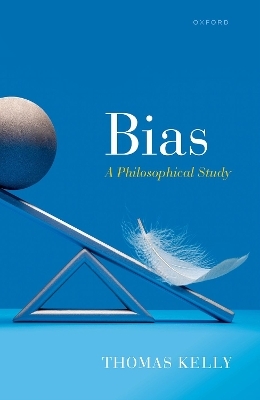
Bias
Oxford University Press (Verlag)
978-0-19-284295-4 (ISBN)
Bias seems to be everywhere. Biased media outlets decisively influence the political opinions and votes of millions of people. Discriminatory policies favor some racial groups over others. We tend to judge ourselves more favorably than our peers, and more favorably than the evidence warrants. But what is it, exactly, for a person or thing to be biased?
In Bias: A Philosophical Study, Thomas Kelly explores a number of foundational questions about the nature of bias and our practices of attributing it. He develops a general framework for thinking about bias, the norm theoretic account, and shows how that framework illuminates much that we say and think about bias in both everyday life and the sciences. He argues provocatively that both morality and rationality sometimes require us to be biased; that groups of people can be biased even if none of their members are; that we are often rationally required to believe that those who disagree with us are biased, even if we know absolutely nothing about why they believe as they do or about their psychologies; and that whether someone counts as biased is often a relative matter. He defends the possibility of what he calls 'biased knowing' and argues that the phenomenon has significant implications for both philosophical methodology and scepticism.
A central aim of the book is to expand the range of issues that have thus far been considered under the heading 'the philosophy of bias' by putting new theoretical questions on the table and proposing bold answers that can serve as starting points for future inquiry.
Thomas Kelly is a Professor of Philosophy at Princeton University, where he has taught since 2004. He has written a number of widely cited and influential papers in epistemology and related areas, addressing topics such as the epistemic significance of disagreement, the relationship between theoretical and practical rationality, and foundational questions about the nature of evidence. Prior to coming to Princeton, he taught at the University of Notre Dame and was a Junior Fellow in the Harvard Society of Fellows, where he also received his PhD.
Introduction
Part I: Conceptual Fundamentals
1: Diversity, Relativity, Etc.
2: Pluralism and Priority
Part II: Bias and Norms
3: The Norm-Theoretic Account of Bias
4: The Bias Blind Spot and the Biases of Introspection
5: Biased People
6: Norms of Objectivity
7: Symmetry and Bias Attributions
Part III: Knowledge
8: Bias and Knowledge
9: Knowledge, Skepticism, and Reliability
10: Bias Attributions and the Epistemology of Disagreement
11: Main Themes and Conclusions
Acknowledgements
References
| Erscheinungsdatum | 14.11.2022 |
|---|---|
| Zusatzinfo | None |
| Verlagsort | Oxford |
| Sprache | englisch |
| Maße | 162 x 241 mm |
| Gewicht | 568 g |
| Themenwelt | Geisteswissenschaften ► Philosophie ► Allgemeines / Lexika |
| Geisteswissenschaften ► Philosophie ► Erkenntnistheorie / Wissenschaftstheorie | |
| Geisteswissenschaften ► Philosophie ► Ethik | |
| ISBN-10 | 0-19-284295-1 / 0192842951 |
| ISBN-13 | 978-0-19-284295-4 / 9780192842954 |
| Zustand | Neuware |
| Haben Sie eine Frage zum Produkt? |
aus dem Bereich


